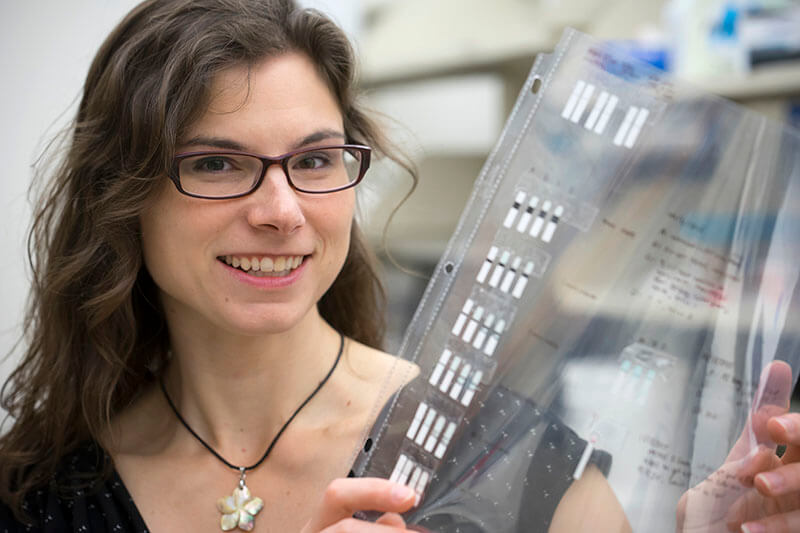May 2, 2017
Device utilizing molecular technique could provide ultra-sensitive, automated system to detect viruses, disease
 Jacqueline Linnes, an assistant professor in Purdue’s Weldon School of Biomedical Engineering, is developing nucleic acid amplification tests printed on paper to allow for a low-cost, automated system to detect an infectious virus or disease. (Photo by Vincent Walter)
Download image
Jacqueline Linnes, an assistant professor in Purdue’s Weldon School of Biomedical Engineering, is developing nucleic acid amplification tests printed on paper to allow for a low-cost, automated system to detect an infectious virus or disease. (Photo by Vincent Walter)
Download image
WEST LAFAYETTE, Ind. – An innovation at Purdue University could allow highly sensitive detection of an infectious disease such as HIV or whooping cough by using a low-cost, automated, point-of-care test similar in packaging to a pregnancy test.
The paper-based test could allow ultra-sensitive detection of pathogens with minimal user interaction and without having to send the test to a lab and wait for results.
Jacqueline Linnes, an assistant professor in Purdue’s Weldon School of Biomedical Engineering, is developing the technology using nucleic acid amplification tests (NAAT) on paper, which is a molecular technique used to detect a particular virus or bacterial pathogen in a specimen of blood, tissue or body fluid. Other co-inventors of the technology are Megan Chiu and Rui Shen, two undergraduate students, and Elizabeth Phillips, Kristin Byers and Orlando Hoilett, graduate students, all in Purdue’s College of Engineering.
“Existing NAATs often require the use of a large, bulky instrument that contains complex, injection-molded plastic cartridges that can each cost $30 or more, more than twice as expensive as high-throughput lab-based tests,” Linnes said.
Linnes said current paper-based NAATs pose limitations.
“Other research labs have been developing paper-based NAATs that require multiple, user-activated steps to move the sample from preparation to amplification and then to detection subsystems,” Linnes said. “These user-initiated steps are points of potential error that can result in sample contamination and in uncontrolled timing of amplification reactions. With our technology we aim to integrate each step into a single, low-cost, automated process.”
The Linnes Lab specializes in developing ultrasensitive, low-cost, point-of-care diagnostics by harnessing fluid flow properties of paper and wax. The Linnes Lab has developed a technology to print wax-ink valves that open and close with localized heating to enable multi-step reactions within a single paper-based test.
“Single-step point-of-care diagnostics like tests for pregnancy and malaria use capillary action in paper to move fluids along a detection path,” Linnes said. “Unfortunately, most disease diagnoses require much more complicated multi-step reactions than these simple paper-tests can perform.”
The technology being developed allows for amplification reagents to be printed on paper and switched out for particular gene targets, to detect different diseases or even detect the same pathogen and see if it’s antibiotic-resistant.
The innovation combats the issue of having to incubate the pathogen for a set amount of time, then move the sample to a separate detection, eliminating excessive user interaction.
“NAATs require the pathogen of interest to incubate for 15-30 minutes, sometimes longer before detection,” Linnes said. “Our technology has temperature-controlled wax valves which automate the fluidics on the paper within the device. The valves are able to capture and incubate the fluid for amplification. Once incubated, the valves can be heated by resistors printed on the back-side of the paper to allow the fluid to go downstream to a lateral flow test. This final detection is as easy as visualizing a line on a pregnancy test.”
Linnes said the individual components of the device have been successfully tested.
“We’ve tested each part of the device separately with successful results. Our goal is to do full integration testing when it’s all assembled together this year,” she said. The original research for this project received funding from the Bill & Melinda Gates Foundation Grand Challenges to work toward a platform test to detect HIV. “We’re also working on the detection of cholera, an infectious and often fatal diarrheal disease, in Haiti, as well as Bordetella pertussis, which is whooping cough.”
A video of the technology can be found at https://www.youtube.com/watch?v=0-PNdFxdVGI&feature=youtu.be
The Purdue Research Foundation’s Office of Technology Commercialization has filed a provisional patent for the technology and it is available for license. For information call 765-588-3470 or email innovation@prf.org.
About Purdue Research Foundation Office of Technology Commercialization
The Purdue Research Foundation Office of Technology Commercialization operates one of the most comprehensive technology transfer programs among leading research universities in the U.S. Services provided by this office support the economic development initiatives of Purdue University and benefit the university's academic activities. The office is managed by the Purdue Research Foundation, which received the 2014 Incubator Network of the Year from the National Business Incubation Association for its work in entrepreneurship. For more information about funding and investment opportunities in startups based on a Purdue innovation, contact the Purdue Foundry at foundry@prf.org. For more information on licensing a Purdue innovation, contact the Office of Technology Commercialization at innovation@prf.org.
Purdue Research Foundation contact: Hillary Henry, 765-588-3586, hkhenry@prf.orgSource: Jacqueline Linnes, 765-496-1012, jlinnes@purdue.edu

